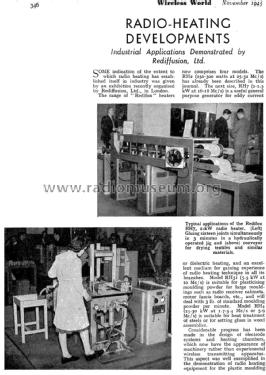Radio Heater RH2
Rediffusion Ltd.; London
- Land
- Grossbritannien (UK)
- Hersteller / Marke
- Rediffusion Ltd.; London
- Jahr
- 1944 ?
- Kategorie
- Diverses (Sonstiges) - siehe Bemerkungen
- Radiomuseum.org ID
- 357724
- Hauptprinzip
- Spezialschaltung (siehe Bemerkungen)
- Wellenbereiche
- Kurzwellen (nur KW)
- Betriebsart / Volt
- Wechselstromspeisung
- Lautsprecher
- - - Kein Ausgang für Schallwiedergabe.
- Material
- Metallausführung
- von Radiomuseum.org
- Modell: Radio Heater RH2 - Rediffusion Ltd.; London
- Form
- Schweres Gerät für Militär oder Industrie (Boatanchor > 20 kg).
- Abmessungen (BHT)
- 15 x 18 x 12 inch / 381 x 457 x 305 mm
- Bemerkung
-
Rediffusion Radio offered several models of radio heaters for industrial applications, each designed for specific purposes and power outputs.
RH2 Model
- Output: 250-300 watts
- Frequency: 25-32 Mc/s
- Application: General-purpose heating, suitable for small-scale operations
The radio heater was designed with safety features for use by unskilled operators, fully enclosed, and simple to operate. It offered significant advantages in industrial processes:
- Uniform heating: Ensured thorough heating of plastic preforms, resulting in consistent insulation quality regardless of thickness.
- Efficiency: Typically, reduced production time by over 50%.
- Versatility: Applications included plastic moulding, glue setting, hardening of small steel parts, and drying of low thermal conductivity materials.
Rediffusion also developed specialised electrode systems and heating chambers, improving the industrial appearance and functionality of their equipment. Notable applications included:
- Continuous drying conveyor for thick fabrics and paper board, using staggered transverse electrodes.
- Glue setting jigs for rescue dinghy paddles and desk assembly.
- The rapid concentration of heat-sensitive chemical liquids in a vacuum.
- Welding of PVC using an "electronic sewing machine".
- Curing of rubber samples.
The radio heater represented a significant advancement in industrial heating technology, offering precise control, efficiency, and versatility across various manufacturing processes.
- Literaturnachweis
- Wireless World (The), London (WW, 79) (Nov 1945, Pages 346, 347)
- Literatur/Schema (1)
- Wireless World (The), London (WW, 79) (Nov 1945, Page Ad 12,)
- Autor
- Modellseite von Gary Cowans angelegt. Siehe bei "Änderungsvorschlag" für weitere Mitarbeit.
- Weitere Modelle
-
Hier finden Sie 4 Modelle, davon mit Bildern und mit Schaltbildern.
Alle gelisteten Radios usw. von Rediffusion Ltd.; London

